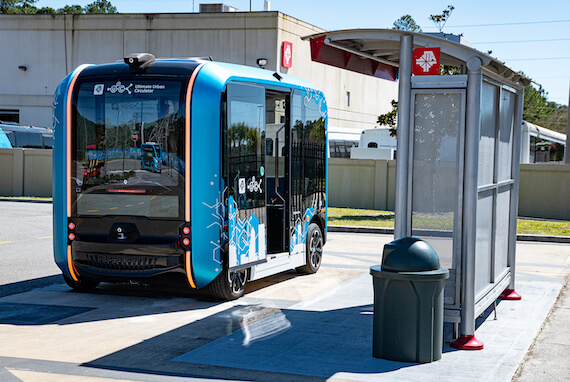JTA’s Ultimate Urban Circulator project could have a rocky path ahead (Courtesy of the Jacksonville Business Journal) — The path forward to making the Jacksonville Transportation Authority’s Ultimate Urban Circulator — usually referred-to as U2C — appears increasingly rocky as leaders question the value of the costly project.
Newly elected City Councilman Jimmy Peluso said he’s always had a hard time grasping the concept of the U2C, what it can deliver and what it will cost to get there.
“I think I’d be fine with it if it was a $20 million plan,” Peluso told the Business Journal.
Design of the first phase of the project is pegged at $5 million with construction at $45 million, according to a handout created by WGI, one of the companies working on U2C. The U2C is supposed to be integrated into the Skyway, which has around a $450 million replacement cost.
“My problem isn’t with autonomous vehicles,” Peluso said. “My concern is that we are putting a lot into highly unproven projects that kind of stand in contrast to what every other major municipality is doing and also where our peer cities and counties are doing.
“I just never properly understood why we got to this point, and I’m now more than ever concerned that it is, and I honestly believe that it will harm our ability as a city to get people to wrap their heads around mass transit.”
There’s a feeling among urban transportation experts that the technology simply isn’t there to do what JTA envisions for the project, which is supposed to take advantage of a fleet of autonomous vehicles that can navigate both the Skyway and surface roads on set routes.
The plans have been in the works for around six years, with an intention of the first phase going into operation in 2025. The Bay Street Innovation Corridor, the first phase of the U2C, will involve shuttle service along Bay Street between Pearl Street and EverBank Stadium, which is around 3.5 miles.
“Our vision for a safe, convenient, autonomous, electric and shared-mobility network for BSIC is on schedule at 60% design and is hitting every milestone we’ve laid out since the project was announced and approved by the JTA Board of Directors and the city of Jacksonville,” according to a JTA statement.
“The BSIC has consistently received bipartisan support and funding at the federal, state and local level. We remain committed to engaging and informing all members of this great community, including new members of the City Council and the public.”
Urban planner Ennis Davis and TransForm Jax co-founder Mike Field, both of whom are involved in Modern Cities, penned a column recently for Jax Today in which they say even the vehicles being tested now by the city aren’t meant to do what the city wants them to do, and further, they’re not an effective alternative for existing transportation.
“In fact, none of the vehicles JTA is testing can carry as many people or move as quickly as light rail, streetcars or buses — or even the existing, increasingly deteriorated Skyway cars,” Davis and Field wrote. “Even in the best-case scenario, the U2C will carry only a fraction of people as the aging system it’s intended to replace.”
The piece drew attention around the city.
“I appreciate the JTA’s efforts on the U2C, but Ennis & Mike are right: there are better ways we can utilize transportation $ in Jax,” Matt Brockelman, chair of the Downtown Development Review Board, posted on X. “That autonomous vehicle tech isn’t ready for prime time yet isn’t JTA’s fault, but pivoting too late to alt solutions would be.”
He congratulated JTA’s leadership for pursuing innovating solutions and that the U2C might be there some day, but that day isn’t today and the local option gas tax means too much to city budgeting for it to be used on what he called a “someday” project.
“Hopefully the U2C issue gets another look from leaders at both JTA & City Hall,” Brockelman wrote. “IMO, a perspective shift here would yield better outcomes for mass transit, downtown activation of JTA real estate, & stewardship of taxpayer dollars.”
Photo courtesy of JTA

